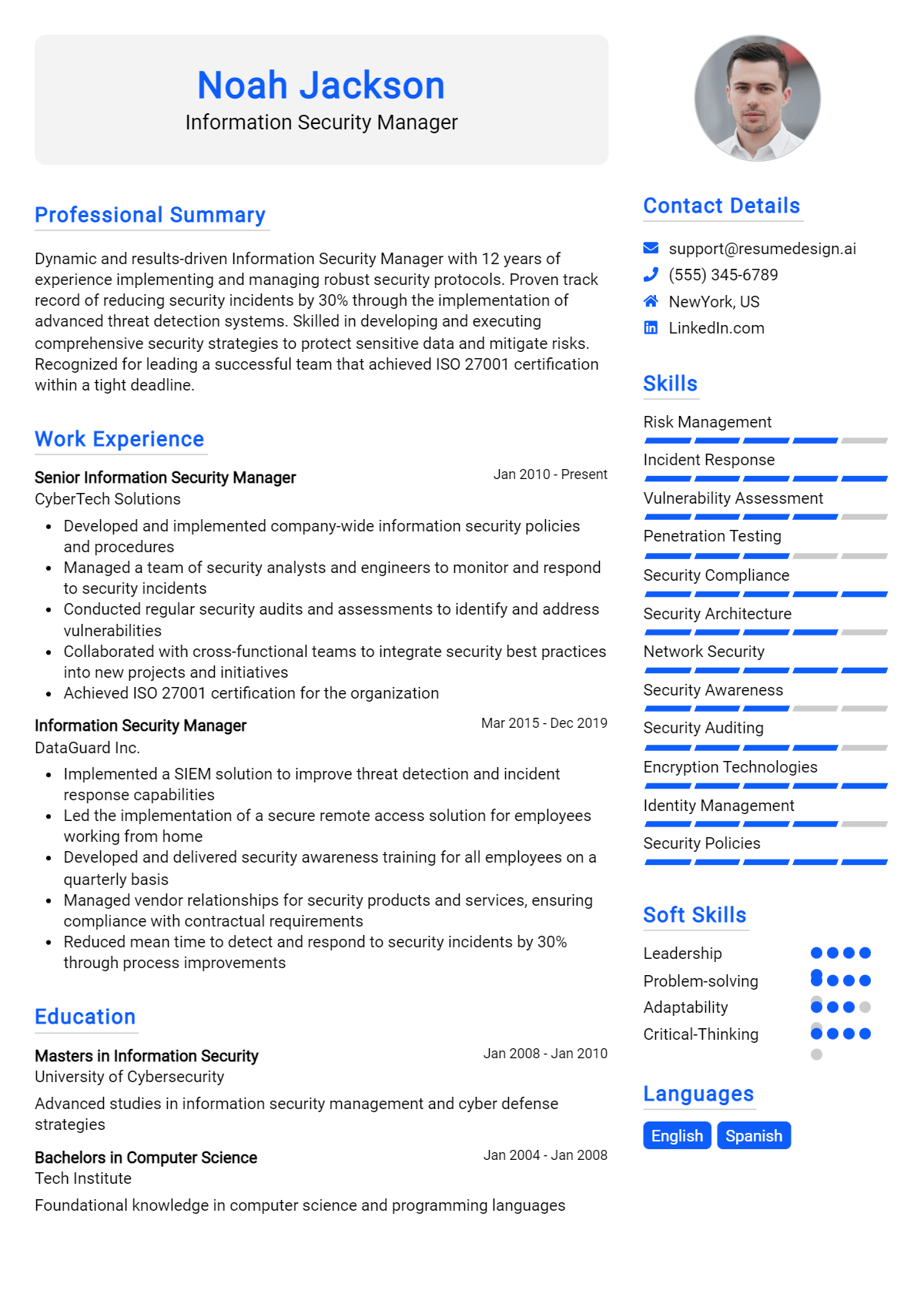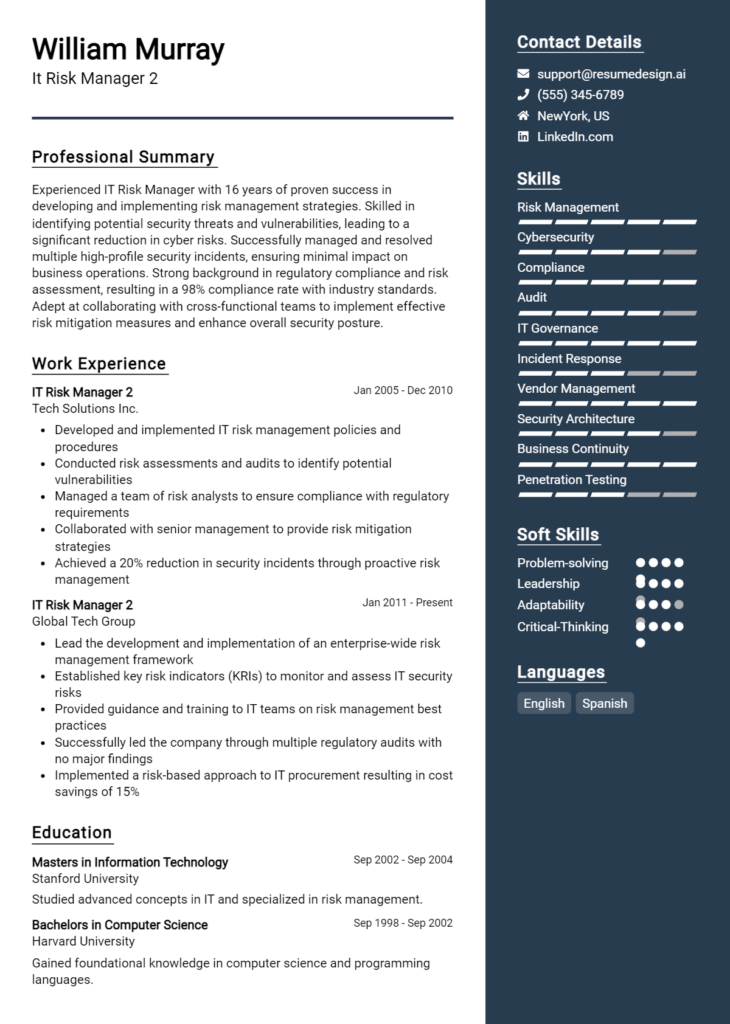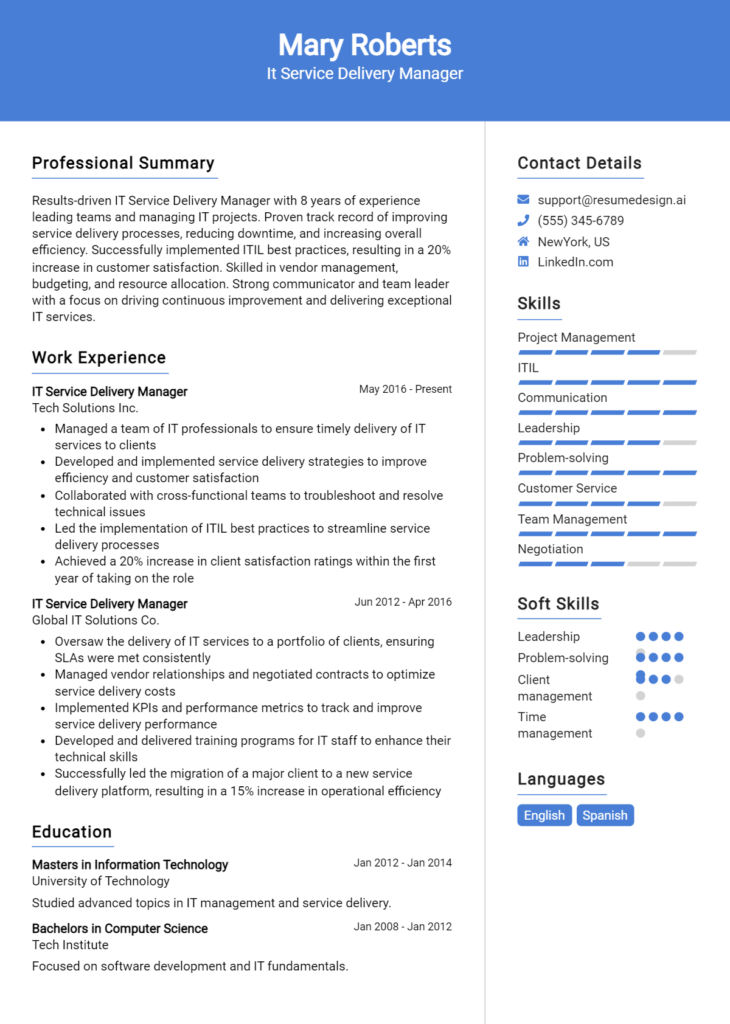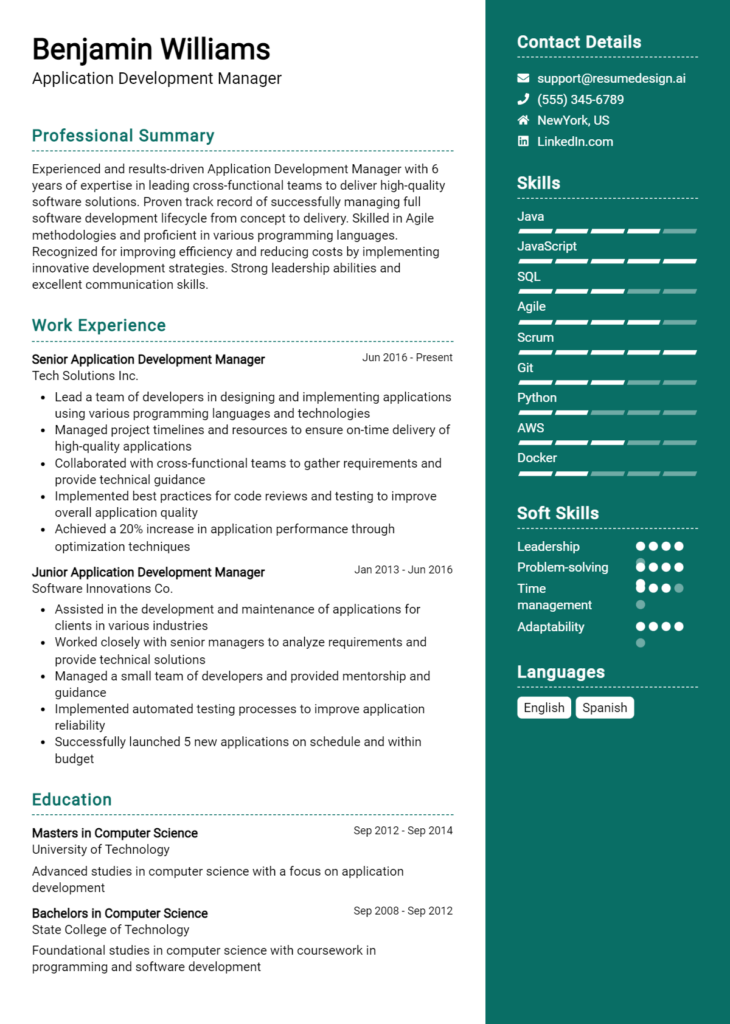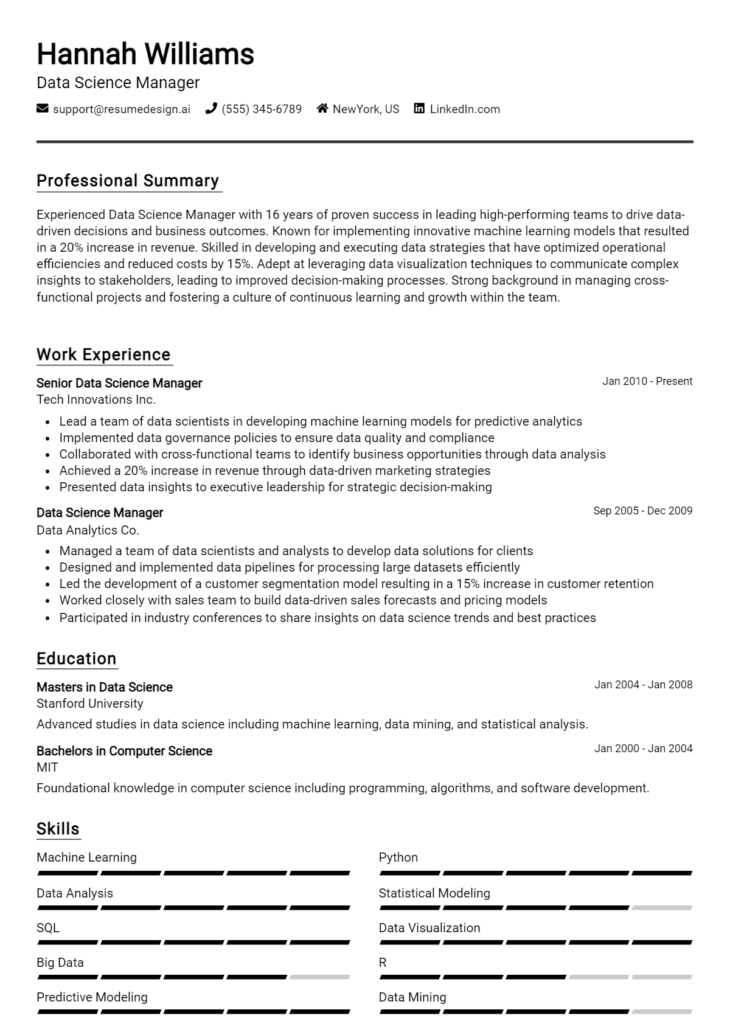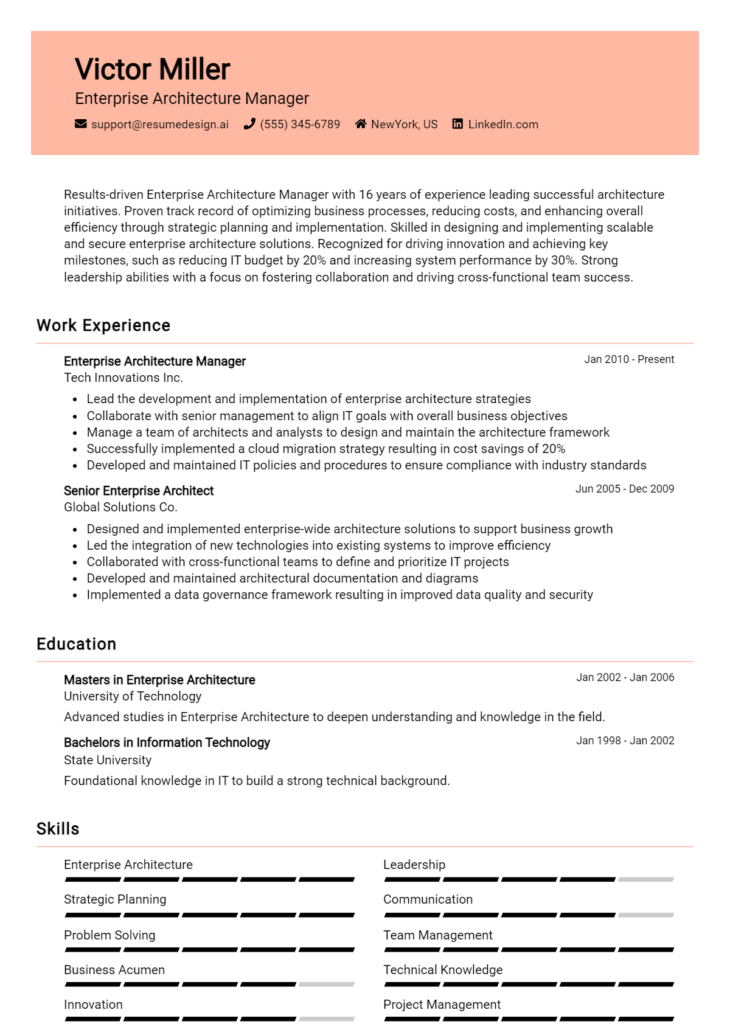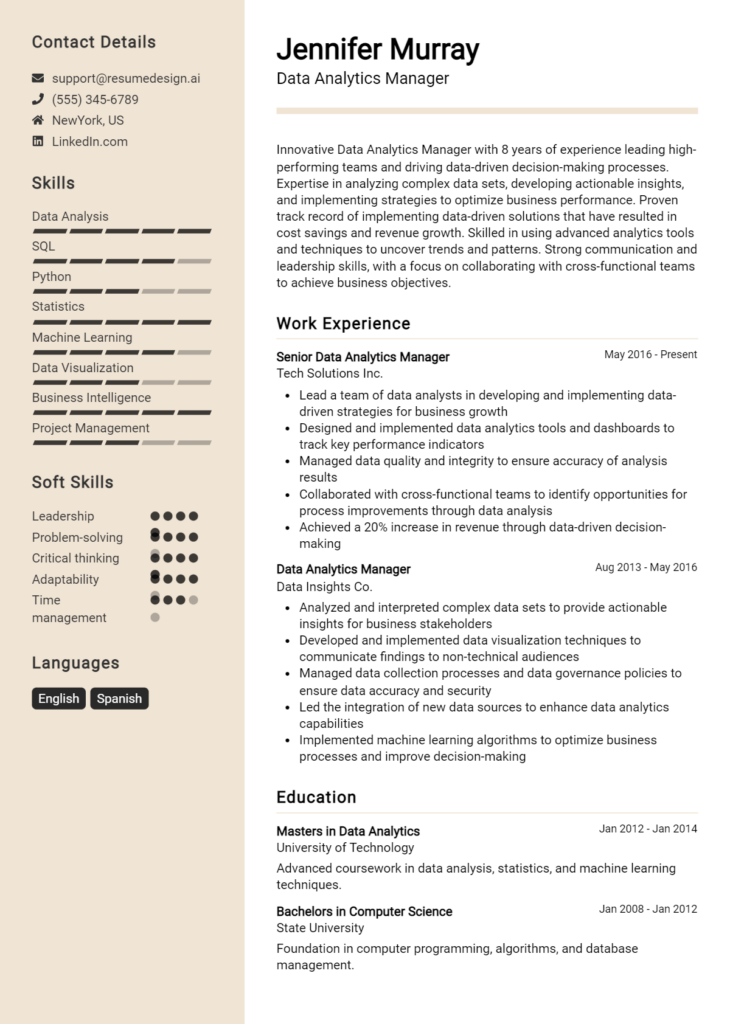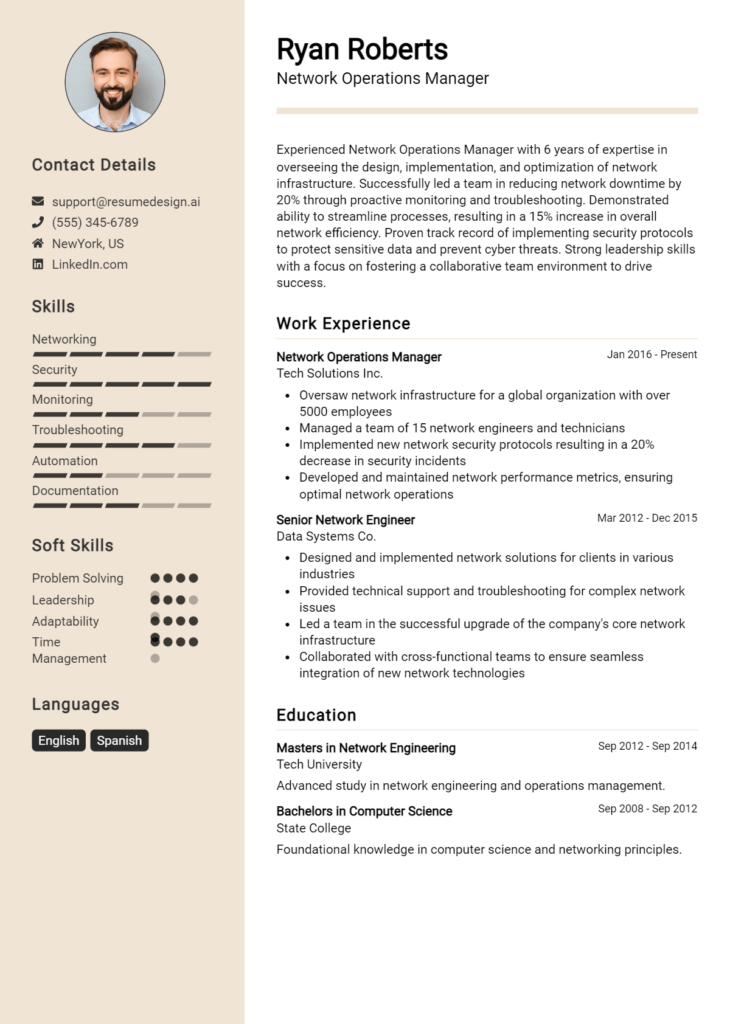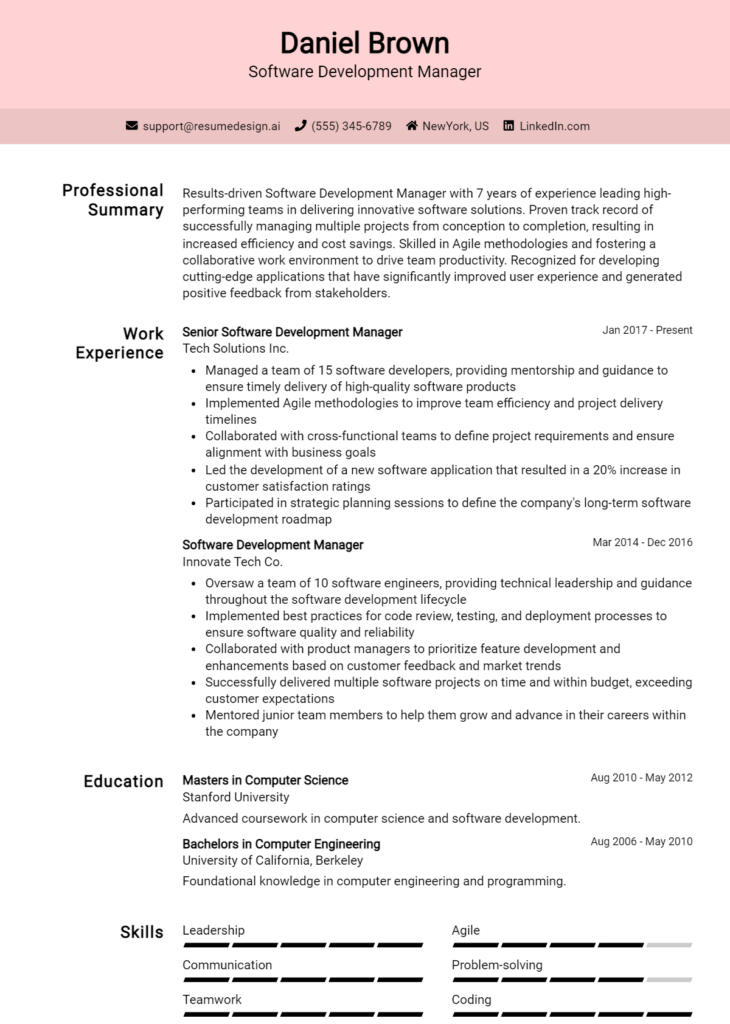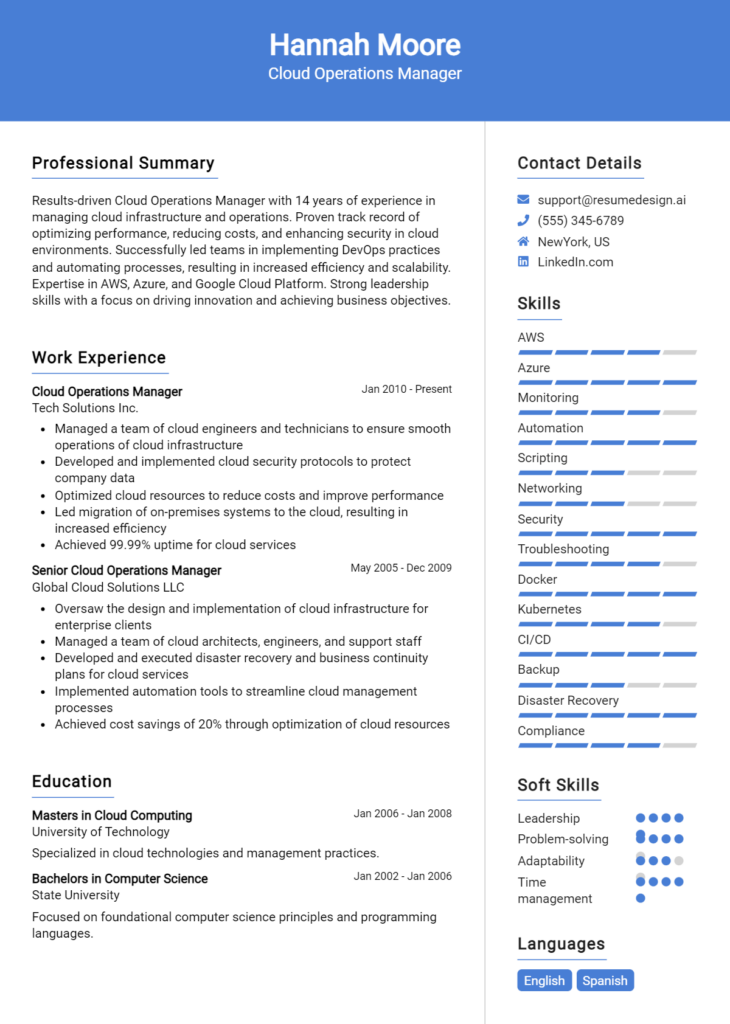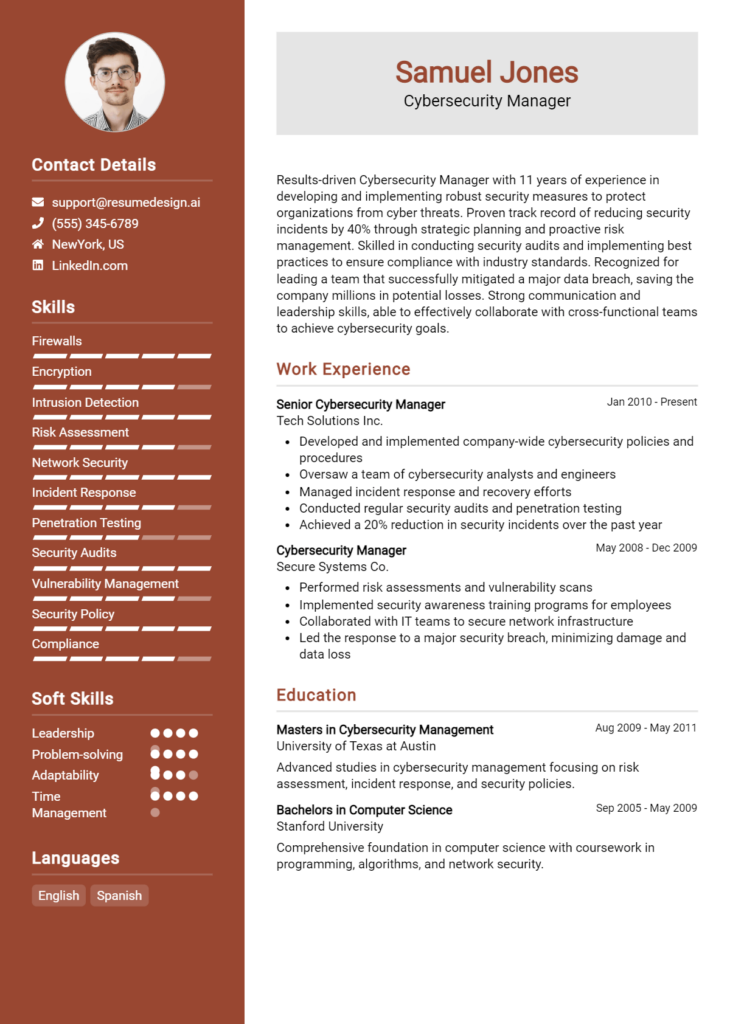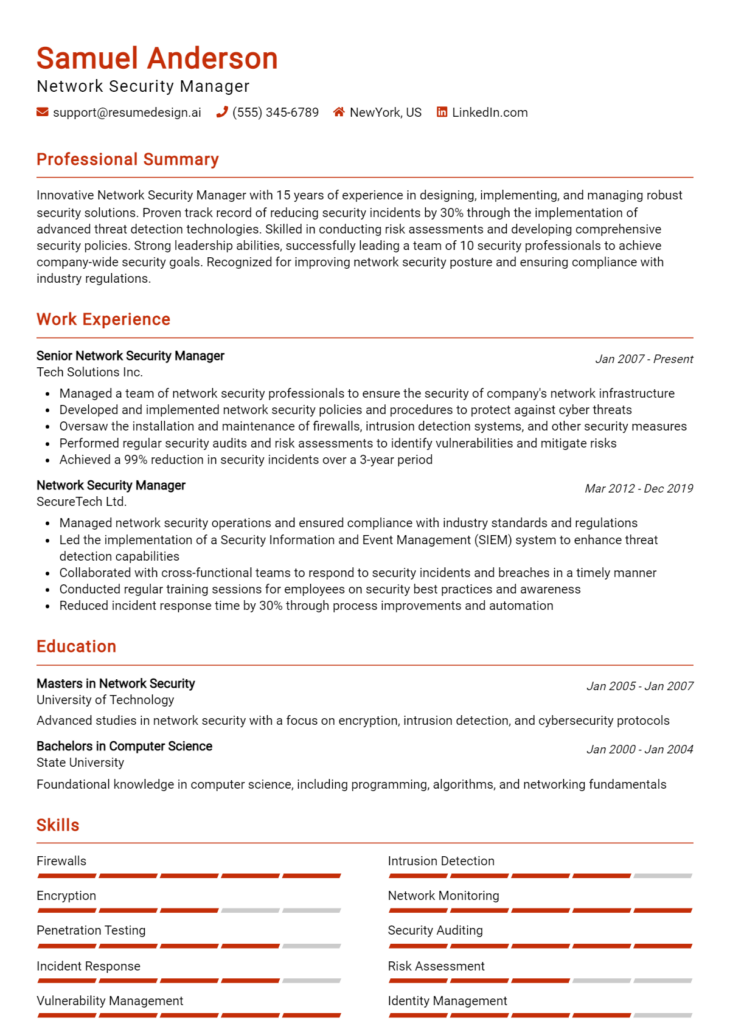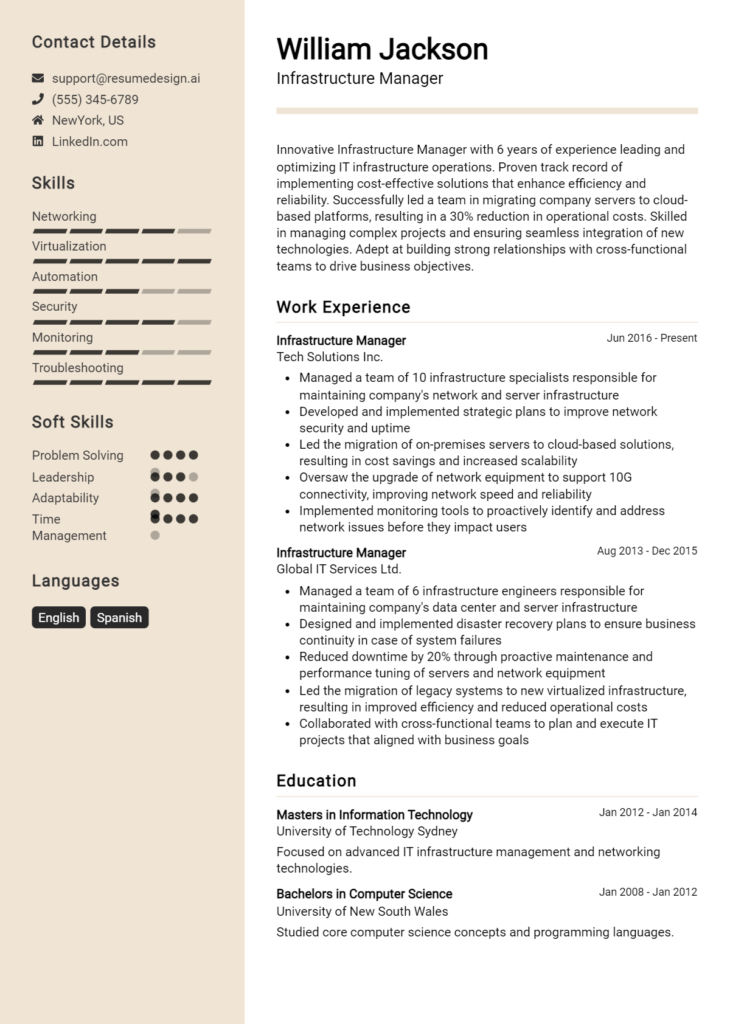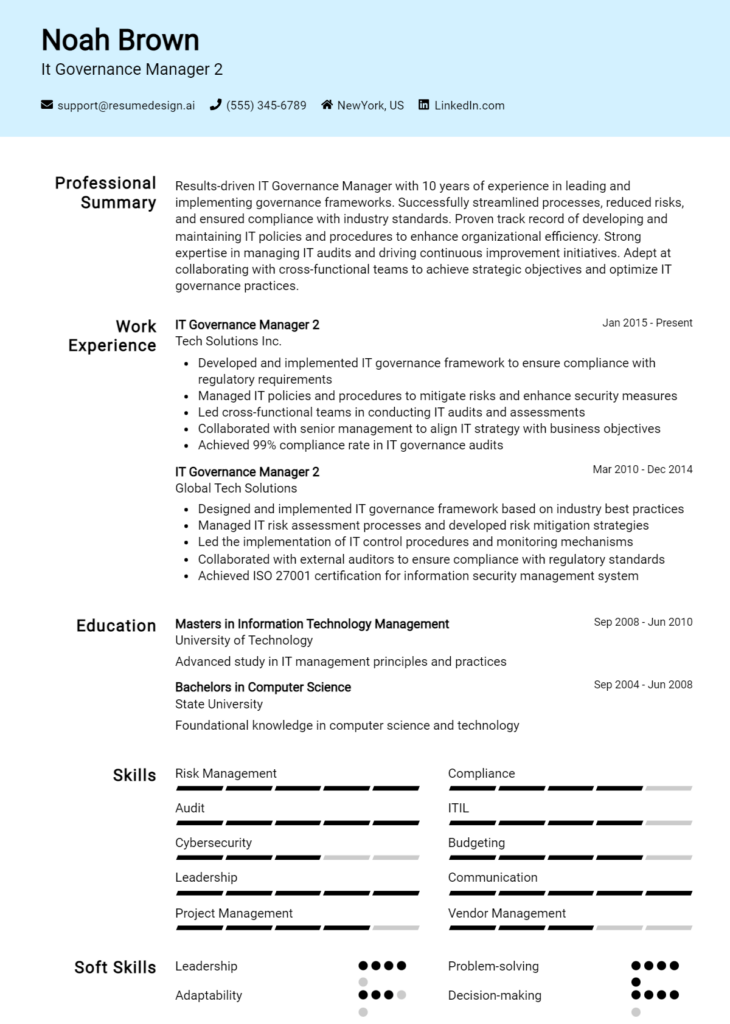Information Security Manager Core Responsibilities
An Information Security Manager plays a critical role in safeguarding an organization's data by bridging various departments such as IT, compliance, and risk management. This professional is responsible for developing and implementing security policies, conducting risk assessments, and leading incident response efforts. Essential skills include technical expertise in cybersecurity, operational management, and strong problem-solving capabilities. These competencies ensure that security strategies align with organizational objectives, making a well-structured resume vital to effectively showcase these qualifications.
Common Responsibilities Listed on Information Security Manager Resume
- Developing and enforcing information security policies and procedures
- Conducting regular risk assessments and vulnerability analyses
- Leading incident response and recovery efforts
- Coordinating security training and awareness programs for employees
- Monitoring security infrastructure and responding to threats
- Collaborating with IT and other departments on security initiatives
- Ensuring compliance with regulatory requirements
- Managing security audits and assessments
- Evaluating new security technologies and tools
- Preparing reports for senior management on security status
- Overseeing the development of disaster recovery plans
- Maintaining relationships with external security vendors and partners
High-Level Resume Tips for Information Security Manager Professionals
In the competitive landscape of cybersecurity, a well-crafted resume is not just a document; it's your first opportunity to make a lasting impression on potential employers. For Information Security Manager professionals, it's essential that your resume encapsulates not only your technical skills but also your accomplishments and leadership qualities. A strong resume reflects your ability to safeguard organizational assets, manage risks, and lead security initiatives. This guide aims to provide you with practical and actionable tips to optimize your resume specifically for the Information Security Manager role, ensuring that you stand out in a crowded job market.
Top Resume Tips for Information Security Manager Professionals
- Tailor your resume to the job description by incorporating relevant keywords and phrases that align with the specific requirements of the position.
- Showcase relevant experience by highlighting your roles in previous positions that involved risk assessment, incident response, and security policy development.
- Quantify your achievements with metrics, such as reduced security incidents by X% or managed a budget of $Y for security initiatives.
- Highlight industry-specific skills, including knowledge of regulatory compliance (e.g., GDPR, HIPAA) and familiarity with security frameworks (e.g., NIST, ISO 27001).
- Include certifications relevant to the field, such as CISSP, CISM, or CEH, to demonstrate your commitment to professional development.
- Use strong action verbs to describe your accomplishments, such as "implemented," "developed," "led," or "optimized," to convey impact.
- Keep the layout clean and professional, using clear headings, bullet points, and consistent formatting for easy readability.
- Incorporate a summary or objective statement at the top of your resume that succinctly captures your career goals and key qualifications.
- Showcase soft skills like leadership, communication, and teamwork, which are essential for a managerial role in information security.
By implementing these tips, you can significantly increase your chances of landing a job in the Information Security Manager field. A resume that effectively highlights your skills, achievements, and industry knowledge not only captures the attention of hiring managers but also positions you as a strong candidate ready to tackle the ever-evolving challenges in cybersecurity.
Why Resume Headlines & Titles are Important for Information Security Manager
In the competitive field of information security, a well-crafted resume headline or title is crucial for standing out to hiring managers. A strong headline serves as a powerful first impression, succinctly summarizing a candidate's key qualifications and highlighting their suitability for the role of Information Security Manager. It can immediately grab the attention of employers, conveying essential skills and experiences in just a few impactful words. A concise, relevant title directly related to the job being applied for can set the tone for the entire resume, making it imperative for candidates to invest time in creating an effective headline that resonates with the desired position.
Best Practices for Crafting Resume Headlines for Information Security Manager
- Keep it concise: Aim for a headline that is no more than 10 words.
- Make it role-specific: Tailor the headline to reflect the position of Information Security Manager.
- Highlight key qualifications: Include specific skills or achievements relevant to information security.
- Use strong action words: Start with impactful verbs that convey leadership and expertise.
- Avoid jargon: Use clear language that is easily understood by hiring managers.
- Incorporate industry keywords: Utilize terminology that aligns with the job description for better visibility.
- Showcase certifications: Mention relevant certifications that enhance credibility in the field.
- Align with company values: Reflect the ethos of the organization you are applying to in your headline.
Example Resume Headlines for Information Security Manager
Strong Resume Headlines
Dynamic Information Security Manager with 10+ Years of Experience in Risk Management
Certified Information Security Professional Specializing in Compliance and Threat Mitigation
Proven Leader in Cybersecurity Strategy and Incident Response Management
Results-Driven Information Security Manager with Expertise in Cloud Security Solutions
Weak Resume Headlines
Information Security Manager Looking for Opportunities
Experienced Professional in IT and Security
Strong headlines are effective because they are specific, showcasing the candidate's experience and expertise while directly aligning with the job role. They communicate confidence and capability, making a compelling case for the candidate's fit for the position. In contrast, weak headlines fail to impress due to their vagueness and lack of detail; they do not convey any unique strengths or relevant qualifications, which can lead hiring managers to overlook the resume entirely. A strong headline not only captures attention but also invites further exploration of the candidate’s qualifications.
Writing an Exceptional Information Security Manager Resume Summary
A well-crafted resume summary is essential for an Information Security Manager as it serves as the first impression for hiring managers. A strong summary quickly captures attention by succinctly showcasing key skills, relevant experience, and noteworthy accomplishments aligned with the role. It acts as a powerful marketing tool that highlights the candidate's qualifications in a concise manner, making it easier for potential employers to assess their fit for the position. Tailoring the summary to the specific job application is crucial; this ensures that the candidate stands out in a competitive field by addressing the unique needs of the employer.
Best Practices for Writing a Information Security Manager Resume Summary
- Quantify achievements to demonstrate impact, such as percentage improvements in security protocols or reductions in incidents.
- Focus on relevant skills like risk management, compliance, incident response, and threat analysis.
- Tailor the summary to align with the job description, incorporating keywords that match the employer's requirements.
- Keep it concise, ideally between 3-5 sentences, to maintain the reader's attention.
- Highlight leadership experience, especially in team management and cross-departmental collaboration.
- Showcase certifications and relevant training, such as CISSP, CISM, or ISO 27001, to add credibility.
- Use action-oriented language to convey a sense of proactivity and effectiveness.
- Include specific technologies or methodologies used in past roles, such as SIEM systems or vulnerability assessments.
Example Information Security Manager Resume Summaries
Strong Resume Summaries
Dynamic Information Security Manager with over 8 years of experience in developing comprehensive security strategies that reduced security incidents by 40%. Proven track record in leading cross-functional teams to implement ISO 27001 standards, ensuring compliance and enhancing data protection across the organization.
Results-driven Information Security Manager with expertise in risk assessment and incident response. Successfully managed a security program that decreased phishing attacks by 60% through employee training and advanced monitoring tools, demonstrating a robust capability in safeguarding organizational assets.
Accomplished Information Security Manager with a decade of experience in cybersecurity frameworks and governance. Spearheaded a risk management initiative that improved compliance audit scores from 75% to 95% within one year, showcasing a strong ability to align security processes with business objectives.
Weak Resume Summaries
Experienced IT professional with knowledge of security systems and protocols. Looking for a position to apply my skills in a challenging environment.
Information Security Manager with a background in various technologies. I am seeking new opportunities to further my career in cybersecurity.
The examples of strong resume summaries are effective because they quantify achievements, highlight specific skills, and directly relate to the role of an Information Security Manager. They provide concrete evidence of the candidate's impact and expertise, making them memorable to hiring managers. In contrast, the weak summaries lack specificity and quantifiable results, making it difficult for employers to gauge the candidate's qualifications and potential contributions to their organization.
Work Experience Section for Information Security Manager Resume
The work experience section of an Information Security Manager resume is crucial as it serves as a testament to the candidate's technical acumen, leadership capabilities, and ability to deliver high-quality results in a complex field. This section not only highlights the candidate's specific skills in information security but also demonstrates their proficiency in managing teams and projects. By quantifying achievements and aligning experiences with industry standards, candidates can effectively showcase their value to potential employers, illustrating how they can contribute to the security posture of an organization.
Best Practices for Information Security Manager Work Experience
- Highlight relevant technical skills, including specific security frameworks and tools used.
- Quantify achievements with metrics (e.g., reduced incidents by 30%, managed a team of 10).
- Demonstrate leadership by detailing team management and mentorship experiences.
- Include specific projects or initiatives that relate to industry standards and compliance.
- Showcase collaboration with cross-functional teams, emphasizing communication and teamwork.
- Use action verbs to convey impact and responsibilities clearly.
- Tailor experiences to align with the job description and employer expectations.
- Avoid jargon and ensure clarity for non-technical stakeholders reviewing the resume.
Example Work Experiences for Information Security Manager
Strong Experiences
- Led a team of 15 security analysts to implement a new threat detection system, resulting in a 40% decrease in security incidents over two years.
- Managed the deployment of a company-wide security awareness training program, achieving a 75% increase in employee compliance with security protocols.
- Conducted risk assessments and vulnerability scans, leading to the remediation of over 500 security vulnerabilities within six months.
- Collaborated with IT and development teams to integrate security best practices into the software development lifecycle, enhancing product security by 50%.
Weak Experiences
- Worked on security projects that involved various technologies.
- Assisted in implementing security measures for the company.
- Participated in team meetings to discuss security issues.
- Helped with training staff on security practices.
The examples are considered strong because they provide specific, quantifiable outcomes and articulate the candidate's leadership and collaborative efforts in meaningful projects. In contrast, the weak experiences lack detail and measurable results, failing to convey the candidate's impact or skill level effectively. Strong experiences demonstrate the candidate's capability to enhance security measures, while weak experiences remain vague and unimpressive, missing opportunities to showcase true expertise.
Education and Certifications Section for Information Security Manager Resume
The education and certifications section of an Information Security Manager resume plays a crucial role in establishing the candidate's qualifications and expertise in the field. This section not only highlights the academic background of the individual but also underscores their commitment to continuous learning and professional development through industry-relevant certifications. By providing details on relevant coursework, specialized training, and recognized credentials, candidates can significantly enhance their credibility and demonstrate their alignment with the requirements of the job role, making a compelling case for their suitability in the competitive landscape of information security management.
Best Practices for Information Security Manager Education and Certifications
- Focus on relevant degrees such as Computer Science, Information Technology, or Cybersecurity.
- Highlight certifications from recognized organizations, such as CISSP, CISM, or CEH.
- Include any specialized training that pertains to specific security frameworks or compliance standards.
- Provide details on relevant coursework that demonstrates knowledge in security protocols, risk management, and network security.
- Keep the section concise and tailored to the job description, emphasizing qualifications that match the role.
- Showcase advanced credentials or certifications that indicate a higher level of expertise in information security.
- List certifications in reverse chronological order to emphasize recent achievements.
- Consider including online courses or workshops that reflect current trends and emerging technologies in information security.
Example Education and Certifications for Information Security Manager
Strong Examples
- M.S. in Cybersecurity, University of California, Berkeley
- CISSP (Certified Information Systems Security Professional), (ISC)²
- CISM (Certified Information Security Manager), ISACA
- Coursework: Advanced Network Security, Information Risk Management, and Incident Response Planning
Weak Examples
- B.A. in Fine Arts, Some University
- Certification in Basic Computer Skills, Non-Recognized Institution
- Outdated certification: Security+ (obtained over 10 years ago with no updates)
- Coursework: Introduction to Graphic Design
The examples provided serve to illustrate strong and weak qualifications within the education and certifications section. Strong examples reflect degrees and certifications that are directly relevant to the field of information security management, showcasing a candidate's depth of knowledge and professional development. In contrast, weak examples highlight qualifications that do not pertain to the role or are outdated, ultimately detracting from the candidate's credibility and relevance in a competitive hiring environment.
Top Skills & Keywords for Information Security Manager Resume
As an Information Security Manager, possessing the right skills is crucial for effectively safeguarding an organization’s information assets. A well-crafted resume that highlights both hard and soft skills can significantly enhance your chances of landing an interview. Employers are increasingly looking for candidates who not only have technical expertise but also strong interpersonal abilities to lead teams and communicate security policies effectively. By showcasing your skills, you demonstrate your readiness to tackle the challenges of the role and contribute to the overall security posture of the organization.
Top Hard & Soft Skills for Information Security Manager
Soft Skills
- Leadership
- Communication
- Problem-solving
- Team collaboration
- Critical thinking
- Adaptability
- Project management
- Conflict resolution
- Negotiation
- Time management
- Decision-making
- Emotional intelligence
- Analytical skills
- Creativity
Hard Skills
- Risk assessment and management
- Incident response
- Security policy development
- Network security protocols
- Threat and vulnerability management
- Compliance frameworks (e.g., ISO 27001, NIST)
- Security information and event management (SIEM)
- Firewall and intrusion detection systems
- Data encryption techniques
- Cloud security
- Identity and access management (IAM)
- Penetration testing
- Endpoint security
- Security architecture design
For a comprehensive understanding of how to present these skills effectively, you may want to explore additional resources on skills and work experience that can further enhance your resume.
Stand Out with a Winning Information Security Manager Cover Letter
Dear [Hiring Manager's Name],
I am writing to express my interest in the Information Security Manager position at [Company Name], as advertised on [where you found the job listing]. With over [X years] of experience in information security management and a strong background in risk assessment, compliance, and incident response, I am confident in my ability to contribute effectively to your team and help safeguard your organization’s sensitive data.
In my previous role at [Previous Company Name], I successfully led a team of security professionals in developing and implementing comprehensive security strategies. This included conducting thorough risk assessments, establishing security policies, and ensuring compliance with industry regulations such as GDPR and ISO 27001. By fostering a culture of security awareness among employees through targeted training programs, we reduced security incidents by [X%] over [X years]. My analytical skills and attention to detail enable me to identify vulnerabilities and develop proactive measures to mitigate potential threats.
I am particularly drawn to [Company Name] because of your commitment to innovation and excellence in the technology sector. I am eager to leverage my expertise in threat intelligence and security architecture to enhance your defenses against emerging cyber threats. I am also passionate about collaborating with cross-functional teams to ensure that security considerations are integrated into all aspects of the business, from project inception to deployment.
I would be thrilled to further discuss how my background and vision align with the goals of [Company Name]. Thank you for considering my application. I look forward to the opportunity to contribute to your organization’s success in maintaining the highest standards of information security.
Sincerely,
[Your Name]
[Your LinkedIn Profile]
[Your Phone Number]
[Your Email Address]
Common Mistakes to Avoid in a Information Security Manager Resume
Crafting a resume for an Information Security Manager position requires attention to detail and a clear understanding of the skills and qualifications that employers seek. However, many candidates make common mistakes that can undermine their chances of landing an interview. Avoiding these pitfalls is essential for showcasing your expertise and making a strong impression. Here are some of the most frequent mistakes to look out for when creating your resume:
Vague Job Descriptions: Failing to provide specific details about your previous roles can leave employers clueless about your actual responsibilities and achievements. Use quantifiable metrics to demonstrate your impact.
Ignoring Relevant Certifications: Information security relies heavily on certifications like CISSP, CISM, or CEH. Neglecting to mention these credentials can make you seem less qualified.
Overloading with Technical Jargon: While it's important to showcase your technical skills, using excessive jargon can alienate non-technical hiring managers. Strike a balance by explaining complex terms clearly.
Lack of Tailoring: Sending out a generic resume can be detrimental. Tailor your resume to each job application by highlighting the most relevant experiences and skills for the specific position.
Neglecting Soft Skills: Information security isn’t just about technical skills; soft skills such as communication, leadership, and teamwork are equally important. Failing to showcase these can give an incomplete picture of your capabilities.
Inconsistent Formatting: A cluttered or inconsistent format can make your resume difficult to read. Use clear headings, bullet points, and a consistent font style to improve readability.
Focusing Solely on Responsibilities: Listing only your job duties doesn’t demonstrate your effectiveness. Instead, focus on your accomplishments and the value you brought to previous positions.
Omitting Relevant Experience: If you have experience in related fields, such as IT or compliance, don’t overlook it. Include all relevant experience that helps paint a fuller picture of your qualifications.
Conclusion
As we explored the essential responsibilities and skills required for the role of an Information Security Manager, it became clear that this position is crucial in safeguarding an organization's sensitive data. Key points included the need for expertise in risk assessment, incident response, and compliance with various regulations. Additionally, strong leadership and communication skills are vital for guiding teams and collaborating with other departments.
With the increasing prevalence of cyber threats, the demand for skilled Information Security Managers continues to grow. Thus, it’s imperative to ensure that your resume reflects your qualifications and experiences accurately.
Take a moment to review your Information Security Manager resume. Are your skills and accomplishments clearly articulated? Does it align with the current job market requirements? If you’re looking for a way to enhance your resume, consider utilizing the following tools:
- Explore a variety of resume templates to find a design that best showcases your professional profile.
- Use the resume builder for a streamlined and easy way to create a polished resume.
- Check out resume examples for inspiration and insights on how to present your experience effectively.
- Don’t forget to personalize your application with a compelling cover letter template that highlights your passion for information security.
By taking advantage of these resources, you can ensure that your resume stands out in a competitive job market. Start reviewing and updating your resume today!

